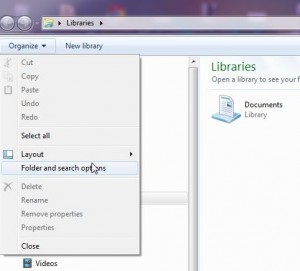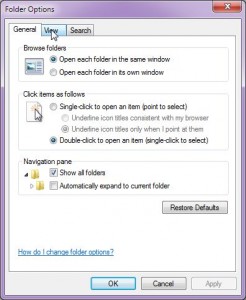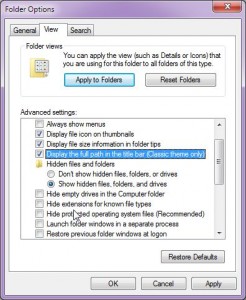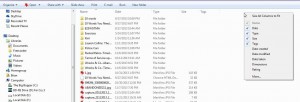Windows Explorer is pretty handy, isn’t it? One click and you can see your whole file system. Um, not quite. By default, you can only see what Microsoft wants you to see. We’re here to change that. Let’s get started.
1. Click on the folder icon on your taskbar. (TIP: If you have one copy of Windows Explorer open already, right click the icon and choose Windows Explorer to get a second one. You can drag and drop files between the windows that way.)
Here’s what you want:

2. On the window that opens up, look up to the top left and click on the word ‘Organize’. On the menu that pops down, choose ‘Folder and search options’:

3. The next menu has some settings that we won’t get into today. What we want now is the View tab:

4. You will want your menu to look exactly like ours. The two things that we think are the most important are ‘Show hidden files, folders and drives’ as well as unhiding extensions for known file types. We’ll tell you why after the photo:

5. Here’s why we want to change the default settings. First, we don’t want any hidden files, folders or drives. If something is on our computer, we want to see it. Second, we want to know how large a file is. That’s pretty basic but, for some reason, Microsoft wants to hide this from you. Third, we live by file extensions here at Computers Made Simple. You’ve read our posts about .avi or.jpg files and maybe you’ve wondered what the heck we’re talking about. Well, unhide the file extensions and you’ll see what type each file is.
There’s one more little trick to show you about Windows Explorer. Icons are great but sometimes you just want to see the file name and how large it is. Up on the top right of your Windows Explorer window, look for the third icon from the right. Far right is a question mark, middle is a small icon of the Explorer window itself then to the left is the one we want. This is where you change your view. You have choices that include Details, Medium Icons and so on. Like this:

6. Here’s what you see when you choose the Details view:

On the far left side we’ve got the drives and main folders. A single click on any of those will bring up its contents on the right side. As you can see, the details view shows you many things about a file or folder: the file name, the date is was created, what type of tile it is, the size, etc. If you right click on the white section just below the light blue area, you’ll bring down a menu that allows you to choose other organizational parameters. Did you change a file yesterday? Put a check beside ‘Date modified’ then look for yesterday’s date. By the way, clicking on any of the parameters, things like Name, Date, Type, Size etc., will organize the whole folder or drive into whatever order you choose. Let’s say you want to find the largest files in a folder. Click on Size to arrange files from the largest to smaller size. Click Size again to toggle that view to smallest to largest.
There are a few other details that we will leave for another post but we think you’ll feel more comfortable using Windows Explorer after reading this post. If you’re nervous about all of this, just take a look around until you feel comfortable with this tool. Once you gt to know Windows Explorer, you’re on your way to becoming a power user. Stick with us and we’ll show you the way.
Thanks for reading! Share this post with friends or, better yet, Like us on Facebook. Here’s the link: Computers Made Simple on Facebook
